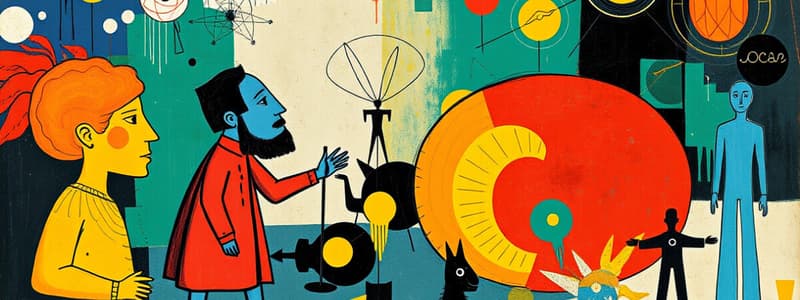Podcast
Questions and Answers
What were medieval scientists known as?
What were medieval scientists known as?
Natural philosophers
Who took an interest in the world around them in the Middle Ages?
Who took an interest in the world around them in the Middle Ages?
Educated Europeans
Instead of making observations on the natural world, what did natural philosophers rely on?
Instead of making observations on the natural world, what did natural philosophers rely on?
A few ancient authorities such as Aristotle for their scientific knowledge
What languages did Renaissance humanists master?
What languages did Renaissance humanists master?
What did the writings of Archimedes, Plato, and Ptolemy make obvious?
What did the writings of Archimedes, Plato, and Ptolemy make obvious?
What played a key role in the scientific achievements of the sixteenth and seventeenth centuries?
What played a key role in the scientific achievements of the sixteenth and seventeenth centuries?
Who was among the first to use letters to represent unknown quantities?
Who was among the first to use letters to represent unknown quantities?
Who introduced the decimal system?
Who introduced the decimal system?
Who invented a table of logarithms?
Who invented a table of logarithms?
What did the works of Stevin and Napier do?
What did the works of Stevin and Napier do?
How was the study of mathematics promoted in the Renaissance?
How was the study of mathematics promoted in the Renaissance?
Who were the four great mathematicians of the Scientific Revolution?
Who were the four great mathematicians of the Scientific Revolution?
What did these mathematicians believe?
What did these mathematicians believe?
How did mathematicians develop new theories that created the foundation for the Scientific Revolution?
How did mathematicians develop new theories that created the foundation for the Scientific Revolution?
What made it easier for scientists to demonstrate the proof of abstract theories with clear, logical evidence?
What made it easier for scientists to demonstrate the proof of abstract theories with clear, logical evidence?
What led to a new conception of the universe?
What led to a new conception of the universe?
Besides math and astronomy, what other achievements were made during the Scientific Revolution?
Besides math and astronomy, what other achievements were made during the Scientific Revolution?
Who was the greatest astronomer of antiquity?
Who was the greatest astronomer of antiquity?
What did philosophers of the Middle Ages use to construct a model of the universe?
What did philosophers of the Middle Ages use to construct a model of the universe?
What does geocentric mean?
What does geocentric mean?
How is the universe seen in the Ptolemaic system?
How is the universe seen in the Ptolemaic system?
What did Ptolemy see planets as?
What did Ptolemy see planets as?
What is at the very end of the Ptolemaic universe?
What is at the very end of the Ptolemaic universe?
What does heliocentric mean?
What does heliocentric mean?
What was Copernicus's book called?
What was Copernicus's book called?
What did Copernicus believe?
What did Copernicus believe?
How did Copernicus explain the apparent rotation of the Sun around the Earth?
How did Copernicus explain the apparent rotation of the Sun around the Earth?
After Copernicus, who took the next step in destroying the Ptolemaic system?
After Copernicus, who took the next step in destroying the Ptolemaic system?
What did Kepler believe that was different from Copernicus?
What did Kepler believe that was different from Copernicus?
What was this finding called?
What was this finding called?
Who discovered what planets were made of?
Who discovered what planets were made of?
What did Galileo teach?
What did Galileo teach?
Who was the first European to make observations through a telescope?
Who was the first European to make observations through a telescope?
What discoveries did Galileo make with his telescope?
What discoveries did Galileo make with his telescope?
Flashcards are hidden until you start studying
Study Notes
Medieval Knowledge and Transition
- Medieval scientists, known as natural philosophers, relied on ancient authorities like Aristotle rather than direct observations.
- Educated Europeans began taking an interest in the natural world during the Middle Ages.
Renaissance Humanism
- Renaissance humanists mastered Latin and Greek, enabling access to works by Archimedes, Plato, and Ptolemy.
- The writings of these figures contradicted Aristotle and other accepted medieval authorities, leading to new scientific ideas.
Mathematical Advances
- Mathematics played a critical role in scientific advancements during the sixteenth and seventeenth centuries.
- Francois Viete introduced letters to represent unknown quantities, laying the groundwork for modern algebra and trigonometry.
- Simon Stevin introduced the decimal system, and John Napier invented a table of logarithms, facilitating complex calculations.
New Theories and Discoveries
- The study of mathematics flourished due to the rediscovery of ancient mathematicians' works, fostering new theories.
- Four great mathematicians of the Scientific Revolution—Copernicus, Kepler, Galileo, and Newton—believed that nature's secrets were expressed mathematically.
Astronomy and the Universe
- Discoveries in astronomy led to a radical new conception of the universe, moving towards heliocentrism.
- The Ptolemaic System, based on Ptolemy and Aristotle's concepts combined with Christianity, depicted the Earth at the universe's center (geocentric).
Ptolemaic Model
- In the Ptolemaic universe, planets were seen as heavenly orbs, with concentric spheres surrounding Earth, capped by God and heaven.
- The "prime mover" was responsible for motion in this model.
Copernican Revolution
- Copernicus's work, "On the Revolutions of the Heavenly Spheres," advocated for a heliocentric model, claiming planets revolved around the sun.
- Copernicus explained the perceived motion of the sun as a result of Earth rotating on its axis.
Kepler and His Laws
- Johannes Kepler built upon Copernicus's theories by establishing Kepler's First Law, stating that planets travel in elliptical orbits, not perfect circles.
Galileo's Contributions
- Galileo Galilei pioneered the use of the telescope to observe celestial bodies, discovering that they were made of material substance.
- He taught mathematics and made significant discoveries about the makeup of planets, revealing mountains and valleys similar to Earth.
Scientific Advancements Beyond Astronomy
- The Scientific Revolution also brought notable achievements in medicine and chemistry, expanding the scope of scientific inquiry beyond mathematics and astronomy.
Studying That Suits You
Use AI to generate personalized quizzes and flashcards to suit your learning preferences.




